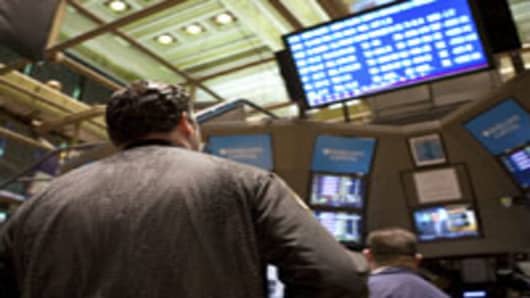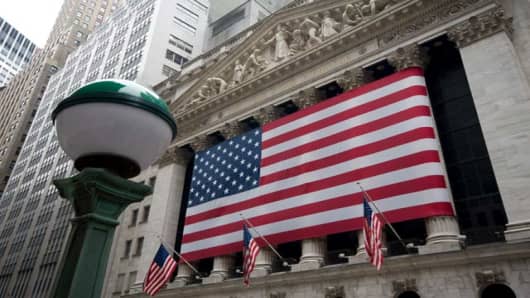The trend for stocks is higher, yet gains in June may be harder to come by unless economic data perks up.
Stocks scored a third month of gains in May, with the S&P 500 up more than 5.3 percent. May was a good month for all types of risk assets. Emerging stock markets flourished, and commodities soared.
The key Reuters CRB index if 19 commodities was up 13.8 percent, its best monthly gain in 35 years. Oil had its best month in 10 years, jumping nearly 30 percent to $66.31 per barrel. As riskier assets won out, the dollar lost ground. The dollar index was down 6.5 percent, its worst month in at least 25 years.
A busy calendar of economic news awaits investors in the week ahead, including the important May jobs report Friday.
Before that, General Motors is expected to file its much anticipated bankruptcy Monday; auto sales are reported Tuesday, and Fed Chairman Ben Bernanke testifies on the economy and budget before Congress Wednesday.
Meanwhile, Treasury Secretary Tim Geithner meets with Chinese officials early in the week on his first official trip to China.
President Obama travels to the Middle East, stopping in Saudi Arabia Wednesday and delivering a major speech in Cairo Thursday on America's relationship with the Muslim world.
Whither Stocks
The stock market will continue to look over its shoulder at the weakening dollar and Treasury market, where rates moved up sharply in the past week.
By Friday though, the rate runup was in reverse, and some yields were at levels close to the week earlier level.
The 10-year's yield Friday was at 3.47 percent, below the key technical level of 3.50 and well below the 3.70 level it hit earlier in the week.
Art Cashin, director of floor trading at UBS, said he's watching the dollar and the Treasury market, where some traders were speculating the Fed would have to increase its purchases to keep rates low.
"I'm worried about the volatility next week. It could be a very interesting week," he said.
Cashin said he's now watching every bit of economic data, and he noted that the Chicago purchasing managers data Friday was surprisingly disappointing.
"I'm still afraid some of the green shoots are poison ivy," he said.
Citigroup chief U.S. equities strategist Tobias Levkovich said he believes the market's current uptrend is in tact, and stocks could see gains of another 10 to 15 percent before the current run is over.
"I still see them rising. Valuation still looks good to us," said Levkovich, in an interview.
He said his sentiment indicator still shows investors are skeptical about the rally.
"While not as freaked out, investors are not as frightened but they are still pretty skeptical. We've gone from very fearful to skeptical and we haven't gotten to bullish. That's ok." "Did we get the bulk of this rally behind us? Probably. Is there still maybe a third of it left? Yes," Levkovich said. "Could it overshoot? Probably..to (S&P) 1100, yes. I don't think I'm reaching for the stars when I suggest that. It's not improbable."
Levkovich said his favorite sectors include capital goods, energy and transportation, as well as diversified financials and insurers.
"We're not so thrilled about defensive areas, utilities, telco or pharma biotech," he said.
Commodities have been moving higher on hopes that the global economy is on the road to repair, but the moves also serve as red flags to some traders, who say they could be flashing warning signs about coming inflation.
However, so far commodities and energy gains have been positives and have fed the stock market's gains.
Energy shares were 10 percent higher in May, and basic materials shares were 5.5 percent higher.
Financials were the best performers, up 13 percent, even after tens of billions of dollars in new stock was issued by the group in the last month.
Econorama
While stock traders say they are not worried about bubbling oil, it is a concern to J.P. Morgan Chief U.S. economist Bruce Kasman.
"Oil already seems to be incorporating a lot more growth. As it is front loaded into the price, it does do damage to a U.S. consumer that is still fragile," he said in an interview.
Kasman said he is not concerned that the recent move in interest rates will hurt the economy, especially since the bond market firmed and rates fell late in the week.
"There are risks around interest rates going up, but I don't think that we've seen up to now enough to get me worked up from a macro point of view. If we stopped here, and we certainly rallied in the last day or two, I would say it's not a big deal in the context of an economy that starts to recover," he said.
In a note, Kasman wrote Friday that the Fed is likely to increase its Treasury purchases at its June 23-24 FOMC meeting.
He said the roster of Fed speakers this coming week allows them to provide insight into the Fed's thinking: "in particular, whether the move in rates is viewed primarily as a healthy return of risk appetites or rather, a less benign development for the economy." The big data in the week ahead is the jobs report Friday.
On Monday, there is also personal income and spending, ISM manufacturing and construction data.
Pending home sales are Tuesday, as are car sales.
ADP's employment report, ISM non manufacturing, and factory orders are released Wednesday morning.
Weekly jobless claims and productivity and costs are reported Thursday. The Bank of England and European Central Bank hold rate meetings Thursday.
Consumer credit is Friday.
Traders say the bankruptcy of General Motors, even with the big government bailout, has already been absorbed by the markets.
But Kasman said it will show up in some of the economic data in coming months, particularly unemployment claims.
He said he expects the auto industry developments are taking 0.50 to 0.75 points off of current quarter GDP growth, which he puts at -0.5 percent.
He said a longer term issue for the economy is the government's overall involvement in industry, including GM.
He said the government's actions with multiple industries may be setting up the U.S. economy for a long slow recovery where there could be a small bounce out of recession, but then a period of even lower growth.
"What you're going to get is a recovery that's not going to have enough growth to get your budget deficits and unemployment rate down," he said.
"If you do this now and you prevent more damaging negative things from happening, you could argue that it helps growth later..But I would suggest that government intervention in terms of what it does to incentives and borrowing costs would be a negative," he said.
Other economic events in the coming week include Bernanke's testimony. He testifies Wednesday at 10 a.m. before the House Committee on the Budget on current economic conditions, financial conditions and the budget.
Geithner is in China Monday and Tuesday. The Treasury Secretary is expected to discuss topics that are of concern to the markets, including the currency relationship, China's appetite for U.S. debt and stimulus spending.
"Geithner's going to assure them we're following reasonable policies..We're not going to devalue the dollar to promote trade," said Marc Chandler, chief currency strategist at Brown Brothers.
There are also plenty of Fed speakers in the coming week.
An important speech to watch will be made by New York Fed President William Dudley, who speaks Thursday to a securities industry conference in New York on the Public Private Investment Program at 8 a.m. Dallas Fed President Richard Fisher speaks about the economy in Texas Tuesday.
Cleveland Fed President Sandra Pianalto speaks in Kentucky Thursday morning.
Bernanke gives opening remarks Thursday morning to a conference on finance and monetary policy in Washington at 8:45 a.m.
Fed Vice Chairman Donald Kohn participates in that conference Friday.
What Else to Watch ASCO, the annual convention of oncologists, takes place over the weekend and developments could affect biotech and pharmacy drugs in the coming week.
Questions? Comments? marketinsider@cnbc.com




